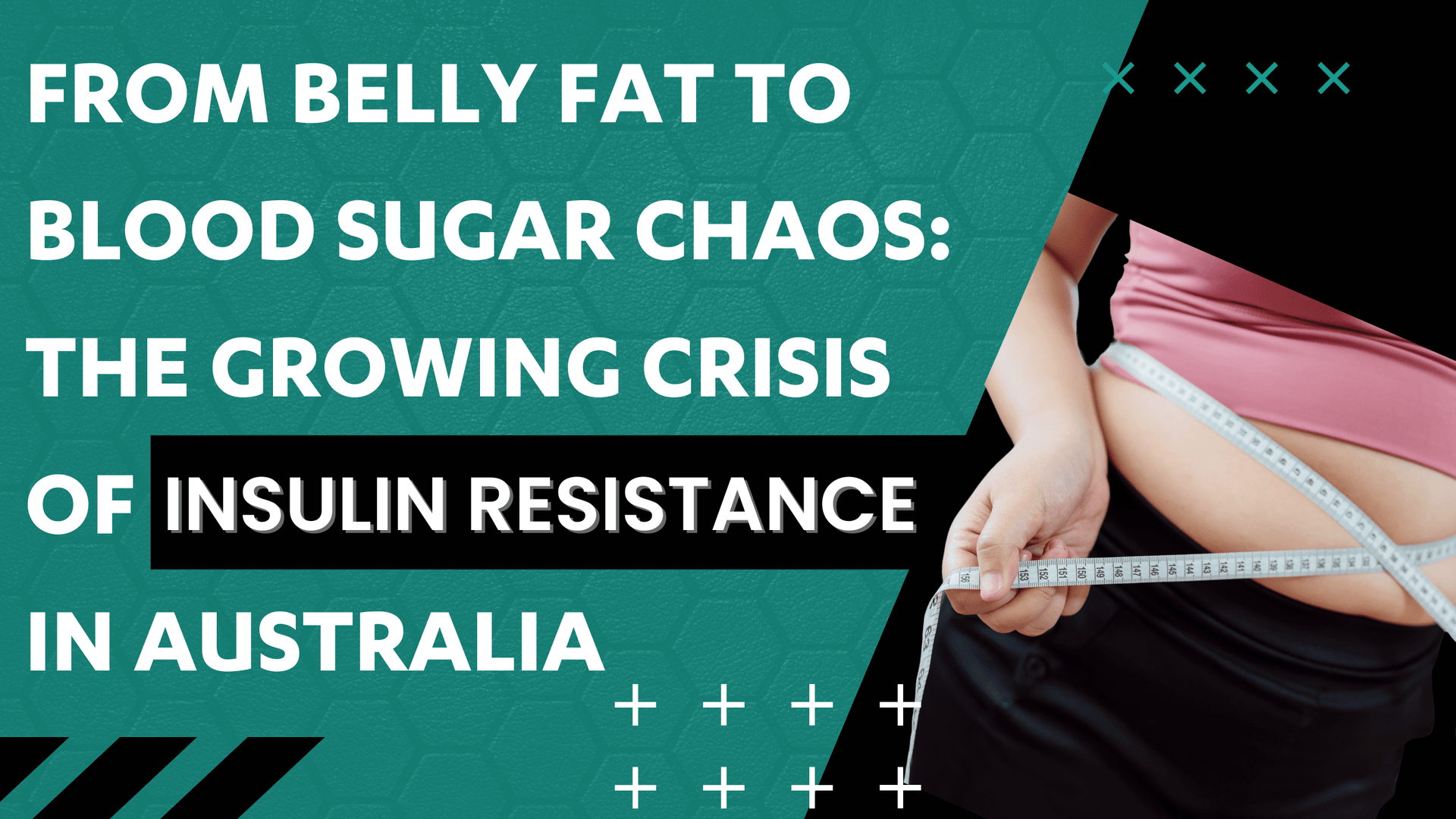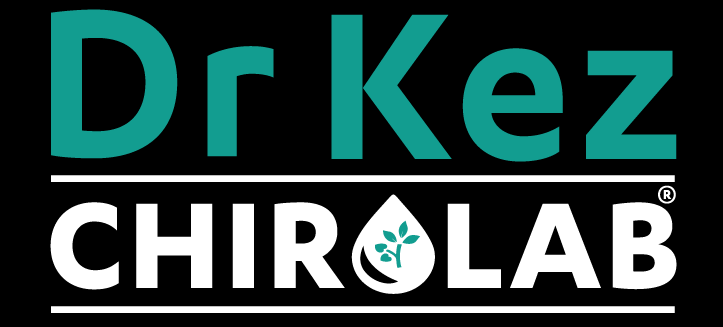
From Belly Fat to Blood Sugar Chaos: The Growing Crisis of Insulin Resistance in Australia


Walk down any supermarket aisle, and you'll see shelves stacked with ultra-processed foods—laden with sugar, refined carbs, and seed oils. What you don’t see as clearly is the epidemic unfolding beneath the surface: central fat accumulation, insulin resistance, and hormonal imbalance.
This isn’t just about losing a few kilos. We're facing an endemic of metabolic dysfunction, with far-reaching consequences: type 2 diabetes, cardiovascular disease, fatty liver and more. And sitting at the crossroads of all of this? The hormone insulin—but it's not acting alone.


Insulin is your body’s blood sugar regulator. When you eat, especially carbohydrates, your pancreas releases insulin to help shuttle glucose out of your bloodstream and into your cells. But if your diet is high in sugar and processed foods, your cells gradually stop responding to insulin’s signal.
This is insulin resistance—the early warning system of metabolic disease. As resistance builds, insulin levels rise to compensate, and this encourages the body to store more fat, especially around the abdomen. Over time, this can lead to chronically high blood sugar, inflammation, and ultimately, type 2 diabetes.
But insulin isn’t the only hormone throwing a spanner in the metabolic works.

Modern life is stressful. And your body’s response to that stress is to release cortisol—a hormone that prepares you for “fight or flight.” In small doses, it’s life-saving. But when cortisol stays elevated for too long, it becomes a metabolic saboteur.

Here’s how high cortisol drives weight gain:
- Raises blood sugar, even without food.
- Increases appetite, especially for sugary or salty foods.
- Promotes fat storage, particularly visceral fat around the belly.
- Disrupts sleep and circadian rhythm, compounding metabolic dysfunction.
- Interferes with insulin signalling, indirectly contributing to insulin resistance.
 Yes—and no. High cortisol doesn’t cause insulin resistance outright, but it creates the perfect environment for it to thrive. When cortisol is chronically elevated, insulin becomes less effective, blood sugar stays high and fat storage increases—particularly around the midsection.
Yes—and no. High cortisol doesn’t cause insulin resistance outright, but it creates the perfect environment for it to thrive. When cortisol is chronically elevated, insulin becomes less effective, blood sugar stays high and fat storage increases—particularly around the midsection.

If you’re in your 40s or 50s and wondering why your belly fat won’t budge, even though you’re eating well and exercising—you’re not imagining it.
During peri-menopause and menopause, levels of oestrogen and progesterone begin to shift, throwing your metabolism off balance.
Hormonal shifts that affect weight during menopause:
- Lower oestrogen slows metabolism and changes fat distribution.
- Progesterone decline affects sleep and mood, increasing stress-eating.
- Higher cortisol (from poor sleep and stress) promotes belly fat.
- Insulin sensitivity naturally declines with age, making blood sugar spikes more common.
This trio—low oestrogen, high cortisol and increasing insulin resistance—is a recipe for central fat storage and stubborn weight.
And to make things harder? Traditional calorie-cutting approaches often backfire, slowing metabolism further and increasing stress hormone output.


The standard Australian diet, high in:
- Refined sugar and carbs
- Processed grains
- Inflammatory seed oils
- Artificial additives
...contributes directly to blood sugar spikes, hormonal imbalance and chronic stress on the body.
Your body interprets these foods as stressors, adding fuel to the fire already burning from emotional, psychological, or physical stress.


In the face of stubborn weight gain—especially for those with insulin resistance or hormonal shifts—many Australians are turning to GLP-1 medications like Ozempic, Wegovy or Mounjaro. These drugs mimic a natural hormone (GLP-1) that helps regulate blood sugar and appetite, and they can lead to rapid weight loss.
But while they may seem like a magic bullet, they come with serious risks and do not address the root cause of metabolic dysfunction.
Reported side effects include:
- Severe nausea and vomiting
- Gallbladder issues
- Muscle loss
- Depression or anxiety
And in rare but alarming cases: gastroparesis (stomach paralysis)—a condition where food stays in the stomach too long, leading to bloating, pain and nutrient absorption issues.
What’s more, studies show that weight often rebounds once the medication is stopped—because the underlying issues like poor diet, inflammation and hormonal imbalance haven’t been resolved.
These drugs are also not approved for cosmetic or casual use in individuals without diabetes or serious obesity-related health risks—yet that’s exactly how they’re being promoted on social media.
Real health isn’t found in a syringe. It’s built from the inside out—through food, movement, stress management and natural metabolic support.

The good news? Hormonal imbalance and insulin resistance can be supported with whole food nutrition, movement and lifestyle changes.
The PlantEm Essentials range offers targeted support for this metabolic storm with a synergy of natural, plant-based ingredients.


Turmeric, cinnamon, and ginger reduce chronic inflammation that worsens insulin resistance and hormonal imbalance. Cinnamon, in particular, supports blood sugar regulation, helping stabilise energy and mood.

A healthy liver is essential for hormone detoxification, especially oestrogen. When liver function is sluggish, excess hormones and toxins can recirculate through the body, worsening symptoms like bloating, fatigue, and weight gain. To protect vital organs, the body often stores these toxins in fat—particularly around the abdomen—making it even harder to shift weight during menopause. CleanEm contains powerful plant foods that support liver function and enhance the body’s ability to clear excess hormones, toxins, and metabolic waste—key for reducing toxic load and rebalancing fat distribution in the menopausal years.

A concentrated dose of leafy greens, moringa, and broccoli sprouts supports energy, cellular repair, and natural detox pathways. These nutrients are especially valuable during menopause to compensate for declining antioxidant capacity and to feed your cells with what they’re missing.

Hormones and gut health are intimately connected. FeedEm provides resistant starches and fibres that fuel a healthy microbiome, which in turn supports estrogen balance, weight regulation, and reduced sugar cravings.


1. Balance your blood sugar
Start each meal with protein, fibre and healthy fats to avoid glucose spikes.
2. Eat a diverse plant-based diet
Include a rainbow of veggies, legumes and whole grains to nourish your gut and regulate hormones.

3. Support stress resilience
Include magnesium-rich foods like leafy greens, nuts, seeds—and wind down with calming rituals.
4. Avoid endocrine disruptors
Reduce toxin exposure from plastics, personal care products and pesticides, which can mimic hormones and worsen imbalance. For more information on how to switch to toxic free personal care products like shampoo, conditioner, body wash and foaming hand wash, click here.

5. Move your body daily
Exercise reduces cortisol, improves insulin sensitivity and boosts happy brain chemicals. Walking, yoga, and strength training are all helpful.
6. Sleep like it matters
Quality sleep lowers cortisol, improves blood sugar control and supports healthy hormone production.

Belly fat, blood sugar issues and hormonal chaos are symptoms of a bigger issue—a system under stress.
Whether you're in your 30s, 50s, or beyond, understanding the hormonal drivers of weight gain helps you shift from frustration to empowerment.
With tools like the PlantEm Essentials range, whole food eating, stress management and movement, you can:
- Improve insulin sensitivity
- Balance your hormones
- Shed stubborn weight
- Reclaim your energy, clarity, and confidence

Explore the PlantEm Essentials range and discover nature’s solution to stress, sugar, and hormonal chaos.
PlantEm Essentials Find Out More.
How Stress Affects your Body and Ways to Help Treat it at Home Find Out More.
How Food Affects Pain and Inflammation Find Out More.
Thrive Through Menopause with Natural Support Balance Find Out More.








